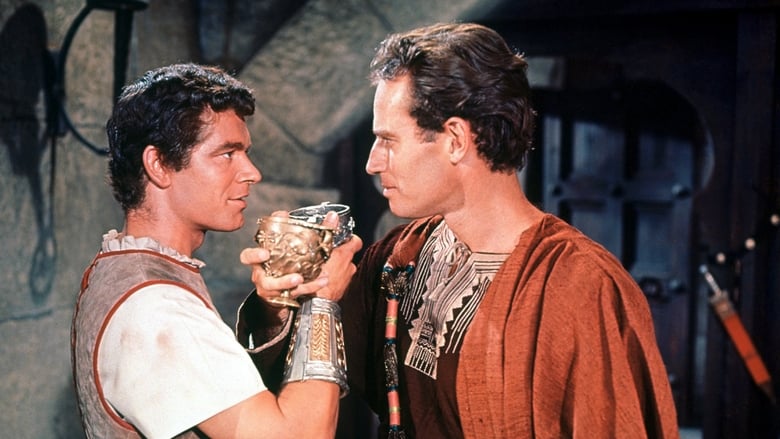← Back to Reviews

in
Ben-Hur (William Wyler, 1959) -


It's rather interesting that the 1950s began and ended with two gargantuan American epics about Rome during the beginning of the Christian era and that Miklos Rozsa composed the scores to both films. 1959 saw Ben-Hur win 11 of its 12 nominations (Room at the Top beat it out for Best Adapted Screenplay) and to this day, that remains tied with Titanic and The Return of the King as the greatest winner of Oscars in a single year. Charlton Heston even won best actor, and even though I thought he was better in Planet of the Apes and The Big Country (another Wyler flick), Chuck does turn in a sincere and extremely-physical performance. The film is often criticized nowadays as being slow as molasses, and I'll admit that the first hour (or about one-fourth) is rather sluggish although it's certainly never boring. This section covers the birth of Christ and the remeeting after many years of Jewish nobleman Judah Ben-Hur (Heston) and his childhood best friend, the Roman Massala (Stephen Boyd). This sets up Judah being thrown into the Roman galleys as a slave and his mother and sister being imprisoned and later becoming lepers. Later on, Judah rescues a Roman general (Jack Hawkins) and becomes his adopted son, as well as the greatest chariot racer in Rome, so that when Judah returns to Jerusalem, he's able to challenge Massala in one of film's all-time classic action scenes.
Besides being about Ben-Hur and the use of 70MM Cinemascope, the film is a low-key presentation of the life of Christ who is occasionally seen in the distance or up close from behind. Jesus never speaks in the film, but his life parallels Ben-Hur's and actually makes sense of all of Judah's trials and tribulations. This is where Ben-Hur draws much of its power since it's one of the few films concerning the Christ which actually shows him actively doing anything without getting into trouble. Just about the biggest thing which Jesus does in this movie is to give Ben-Hur a drink of water when he was tired and thirsty, and this incident stays with Judah's life all the way until the crucifixion where he realizes that Jesus was that man who gave him a will to go on even though he didn't know him and couldn't comprehend why he helped him. Since Ben-Hur is basically a tale of revenge, this parallel story of Jesus and forgiveness just makes the whole thing play out much more complexly, as well as maybe giving your tear ducts a workout. Welshman Hugh Griffith gets extra points for playing an Arab who hires Ben-Hur to ride his white Arabian horses in the arena, and Finlay Currie is another connection to Quo Vadis; here he plays one of the three Wise Men who returns to seek out the grown Jesus and unhappily stumbles upon his horrifying fate.


It's rather interesting that the 1950s began and ended with two gargantuan American epics about Rome during the beginning of the Christian era and that Miklos Rozsa composed the scores to both films. 1959 saw Ben-Hur win 11 of its 12 nominations (Room at the Top beat it out for Best Adapted Screenplay) and to this day, that remains tied with Titanic and The Return of the King as the greatest winner of Oscars in a single year. Charlton Heston even won best actor, and even though I thought he was better in Planet of the Apes and The Big Country (another Wyler flick), Chuck does turn in a sincere and extremely-physical performance. The film is often criticized nowadays as being slow as molasses, and I'll admit that the first hour (or about one-fourth) is rather sluggish although it's certainly never boring. This section covers the birth of Christ and the remeeting after many years of Jewish nobleman Judah Ben-Hur (Heston) and his childhood best friend, the Roman Massala (Stephen Boyd). This sets up Judah being thrown into the Roman galleys as a slave and his mother and sister being imprisoned and later becoming lepers. Later on, Judah rescues a Roman general (Jack Hawkins) and becomes his adopted son, as well as the greatest chariot racer in Rome, so that when Judah returns to Jerusalem, he's able to challenge Massala in one of film's all-time classic action scenes.
Besides being about Ben-Hur and the use of 70MM Cinemascope, the film is a low-key presentation of the life of Christ who is occasionally seen in the distance or up close from behind. Jesus never speaks in the film, but his life parallels Ben-Hur's and actually makes sense of all of Judah's trials and tribulations. This is where Ben-Hur draws much of its power since it's one of the few films concerning the Christ which actually shows him actively doing anything without getting into trouble. Just about the biggest thing which Jesus does in this movie is to give Ben-Hur a drink of water when he was tired and thirsty, and this incident stays with Judah's life all the way until the crucifixion where he realizes that Jesus was that man who gave him a will to go on even though he didn't know him and couldn't comprehend why he helped him. Since Ben-Hur is basically a tale of revenge, this parallel story of Jesus and forgiveness just makes the whole thing play out much more complexly, as well as maybe giving your tear ducts a workout. Welshman Hugh Griffith gets extra points for playing an Arab who hires Ben-Hur to ride his white Arabian horses in the arena, and Finlay Currie is another connection to Quo Vadis; here he plays one of the three Wise Men who returns to seek out the grown Jesus and unhappily stumbles upon his horrifying fate.
